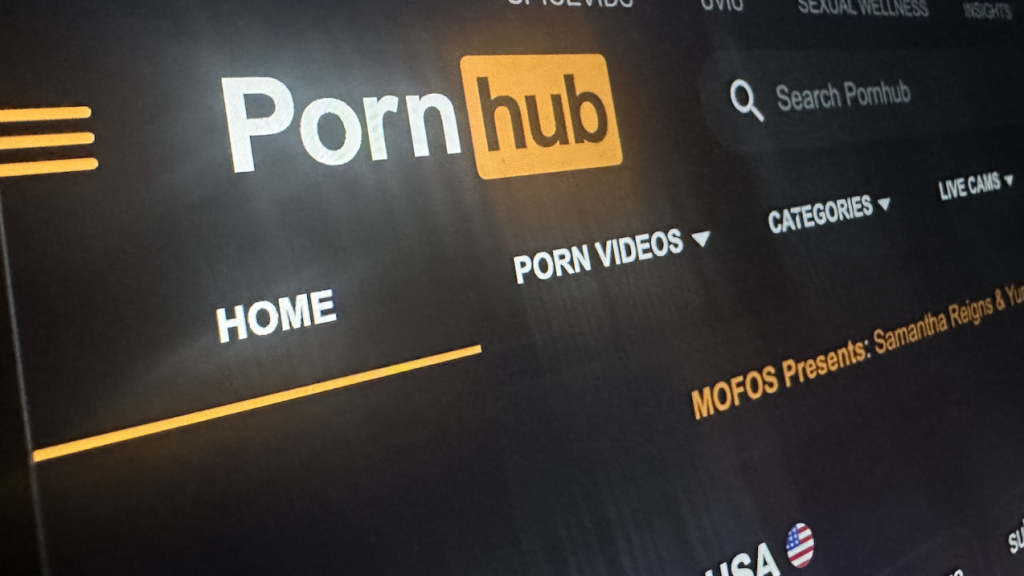
Ohio legislators are advancing a proposal that would mandate residents to verify their age using a state-issued ID before accessing online pornography.
House Bill 84 (H.B. 84), introduced by Republican state representatives Steve Demetriou (R-Bainbridge Twp.) and Josh Williams (R-Sylvania), seeks to prevent minors from viewing explicit content by requiring users to submit proof of age. “I just want to help protect kids here in Ohio from this harmful content online,” Demetriou told reporters.
The Verification Process and Potential Penalties
Under the bill, users would verify their age by submitting a photo of their state ID or entering personal details into a third-party system, which could employ facial recognition technology. Companies failing to comply would face penalties. “Clicking a box that says ‘Yes, I am 18’ is not gonna prevent a 15-year-old boy from going on that website,” Demetriou argued. “Any reasonable person understands that.”
He compared the measure to traditional ID checks at video rental stores, stating, “We’re simply taking those same sort of measures from the Ohio Revised Code into the 21st century.”

Privacy Concerns and Public Backlash
Critics argue the proposal raises serious privacy concerns. Cleveland resident Mallory McMaster questioned the implications of submitting a driver’s license to access adult content. “I would not be watching pornography on a website that required me to upload a photo of my driver’s license,” she said. “I’m not sure where it would end up.”
McMaster likened the proposal to George Orwell’s dystopian novel 1984, warning of potential government overreach. She also voiced concerns about data security, noting, “We’re creating a log of porn that every individual watches, and it’s tracked with our driver’s license and a photo of our faces. Whether it’s hacked by someone who wants to blackmail and extort us, or ICE agents who question our citizenship, or local police investigating an alleged crime, they will all have access to this information.”
Demetriou dismissed these concerns, asserting that data would be protected and deleted immediately. “It’s not like that’s stored for a long period of time,” he said.
Industry Response and Potential Consequences
Pornhub, the most-visited adult content platform in the U.S., and its parent company, Aylo, have expressed concerns over such regulations. In a statement, Aylo noted that in states where similar laws have been enacted, users have migrated to unregulated websites that do not verify age, follow laws, or ensure user safety. The company stated, “People did not stop looking for porn. They just migrated to darker corners of the internet.”
While Aylo supports age verification measures, it emphasized that parents can implement controls on their children’s devices without requiring such invasive regulations. Additionally, the company warned that requiring personal data collection across thousands of adult sites could put user security at risk. “Any regulations that require hundreds of thousands of adult sites to collect significant amounts of highly sensitive personal information is putting user safety in jeopardy,” Aylo stated.
Addressing AI-Generated Content and Future Debates
The proposed bill also aims to criminalize the use of artificial intelligence to create sexually explicit material featuring minors or non-consenting adults. Aylo stated that it already has protocols in place to moderate and remove such content.
As the bill moves forward, critics argue that it could push users toward using virtual private networks (VPNs) to bypass restrictions. McMaster and other opponents believe lawmakers should focus on more pressing issues, such as property taxes and inflation. “I wouldn’t want my local law enforcement agencies watching what pornography I’m watching, even though that would probably really entertain them,” she quipped.
The legislation is set to be further debated in the coming weeks, as lawmakers continue discussions on enforcement and potential repercussions.
For transparency, here is the full statement from Aylo:
First, to be clear, Aylo has publicly supported age verification of users for years, but we believe that any law to this effect must preserve user safety and privacy, and must effectively protect children from accessing content intended for adults.
Unfortunately, the way many jurisdictions worldwide have chosen to implement age verification is ineffective, haphazard, and dangerous. Any regulations that require hundreds of thousands of adult sites to collect significant amounts of highly sensitive personal information is putting user safety in jeopardy. Moreover, as experience has demonstrated, unless properly enforced, users will simply access non-compliant sites or find other methods of evading these laws.
This is not speculation. We have seen how this scenario plays out in the United States. In Louisiana, Pornhub was one of the few sites to comply with the new law. Since then, our traffic in Louisiana dropped approximately 80 percent. These people did not stop looking for porn. They just migrated to darker corners of the internet that don’t ask users to verify age, that don’t follow the law, that don’t take user safety seriously, and that often don’t even moderate content. In practice, the laws have just made the internet more dangerous for adults and children.
The best solution to make the internet safer, preserve user privacy, and prevent children from accessing adult content is performing age verification at the source: on the device. The technology to accomplish this exists today. What is required is the political and social will to make it happen. We are eager to be part of this solution and are happy to collaborate with government, civil society and tech partners to arrive at an effective device-based age verification solution.
In addition, many devices already offer free and easy-to-use parental control features that can prevent children from accessing adult content without risking the disclosure of sensitive user data.